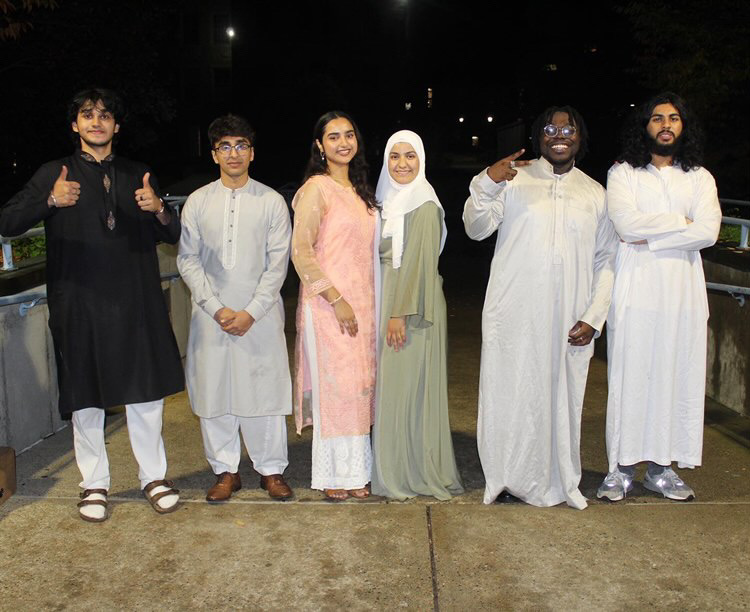URI offers accommodations to students who celebrate Ramadan. Pictured: Students from URI MSA. Photo Courtesy of: URI MSA
Ramadan, the ninth and holiest month of the Islamic calendar according to the Islamic Networks Group, began on March 22, and Muslims worldwide are coming together through fasting, prayer, charity and self-reflection.
Islam’s five pillars are profession of faith, prayer, almsgiving, sawm and pilgrimage, according to the Embassy of the Kingdom of Saudi Arabia’s Website. Sawm is the act of fasting during Ramadan, which is observed by Muslims as an exercise of self-control in addition to being an act of strong personal worship.
After sunset, Muslims break their fast with Iftar — a celebration with family, friends and food.
The University of Rhode Island’s Muslim Student Association (MSA) is hosting Iftar every Thursday during Ramadan in the Multicultural Student Services Center (MSSC), according to fourth-year MSA President Warith Balogun.
“There’s just so many things happening, so I don’t think that we all have the time to sit back and reflect on ourselves, who we are and the higher being that we look up to,” Balogun said. “[Ramadan] is a month for being together with the people you love by enjoying good food and continuous worship.”
As president of the MSA, Balogun aims to spend as much time on weekdays in the MSSC as he can.
Outside of URI, Balogun is also a part of Black Muslim Television (BMTV), a Boston-based digital platform and organization that encourages Black Muslim expression and celebration. He hopes to meet up and break fast with members of BMTV when he visits Boston College, Boston University and Northeastern University.
“As much as [Ramadan] is a time for Muslims to worship God, you know, it’s also a time for good deeds,” Balogun said. “Me and my friends, we plan on making food and bringing food out to some of the homeless communities in New York.”
“There’s always avenues for charity during this month,” Balogun said.
Balogun celebrated Ramadan as a child by fasting and breaking fast with his family, but since coming to college, Balogun found that Ramadan could be much more.
“It’s a way for me to want to connect with other Muslim communities all over, which is why [I] am going to all these different places,” Balogun said. “… During the holidays, people want to be around their communities and their families, and now it’s not just one community, but several.”
Antineice Muhammad, a fourth-year student and MSA secretary, is “excited” for Ramadan, as she views the month as a time to “refocus [her] connection with God.”
Muhammad’s first time on campus for Ramadan was last year, as she spent her first and second years at home due to COVID-19.
When she is at home for Ramadan, Muhammad is “surrounded by family.” Everyone cooks meals together, prays together and breaks their fasts together, creating a “good feeling” of community and support, according to Muhammad.
“It’s definitely been different being on campus because, obviously, my family is at home,” Muhammad said. “Instead of being surrounded by people, I’m just kind of by myself, and it’s a bit different.”
College and life can distract and shift focus away from religion, according to Muhammad. By having a month to take out those distractions and focus on self-growth, Muhammad thinks Ramadan is a “great month.”
“I just like the community that comes from it,” Muhammad said. “It’s a time where all the Muslim students on campus see each other and relate… and have that silent support.”
First-year pharmaceutical sciences major Haneen Alsuwaidani plans to celebrate Ramadan by being more in touch with God, going to the mosque with her family and reading the Quran.
As a child, Alsuwaidani’s Ramadans were spent in Jordan. Until she moved to the U.S. in 2016, the month was characterized by decorated houses, stores open until 3 a.m., visits from her extended family and the sound of the azaan.
The azaan is the alarm that would signal a public prayer, according to Alsuwaidani.
“Oh my god, I love Jordan so much,” Alsuwaidani said. “In Jordan, Ramadan is always so special.”
Because Muslims fast from dawn to dusk, they typically wake up before dawn and eat a light meal called suhoor. Before this year, it was Alsuwaidani’s job to make this meal for her family. Alsuwaidani would also help her mom cook and prepare for the Iftar.
The different meal options and cooking is everyone’s favorite part of the celebration, according to Alsuwaidani.
Although Alsuwaidani has plans to visit her family each weekend during Ramadan, she stated that being apart from them will still be a challenge. She also worries about having the energy to do schoolwork while fasting, as well as having appropriate food options in the dining hall.
“Ramadan, for me, is to make a connection with Allah,” Alsuwaidani said. “To make more connections, to pray more and to try to learn to be a really good person.”
When Ramadan ends on the evening of April 21, Eid al-Fitr begins. This celebration of the end of fasting is when Muslims dress up, eat food, and “celebrate [their] accomplishments,” according to Muhammad.
The MSA plans to do an Eid banquet where Muslim students on campus, as well as family members, are welcome.
Students can access more information and updates about Ramadan and future MSA events through @uri.msa on Instagram.





